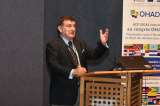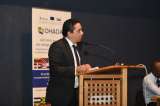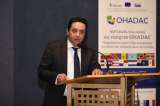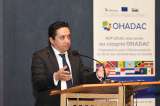 At the OHADAC Convention held on 21 and 22 September in Pointe-à-Pitre, Guadeloupe, a workshop was held on “the OHADAC Model Law on Private International Law”, of which around 80% of the text can be found in the Private International Law Act no. 544-14 of December 2014 of the Dominican Republic.
At the OHADAC Convention held on 21 and 22 September in Pointe-à-Pitre, Guadeloupe, a workshop was held on “the OHADAC Model Law on Private International Law”, of which around 80% of the text can be found in the Private International Law Act no. 544-14 of December 2014 of the Dominican Republic.
The “OHADAC Model Law on Private International Law” was written by a team of academics and researchers under the aegis of Professor José Carlos Fernandez Rozas.
The panel was chaired by:
- Philippe-Henri Dutheil, Lawyer, Chair of the Commission of European and International Affairs at the National Council of the Bar (France),
with speeches from:
- Bertrand Ancel, Professor Emeritus, Panthéon-Assas University (Paris II), France,
- José Carlos Fernández Rozas, Professor of Law at the Complutense University of Madrid, International Arbitrator, Spain,
- Rafael Arenas Garcia, Professor of Law at the Universitat Autònoma de Barcelona, Catalonia, Spain,
- Angel Espiniella Menéndez, Professor of Law at the University of Oviedo, Principality of Asturias, Spain,
In his opening remarks, the chair Philippe-Henri Dutheil explained that the French National Council of the Bar counts 82 representatives. It is the highest institution in this sector in France, bringing together 164 Bars and that it had helped create the OHADA process.
He added that in his opinion, the European Union is falling apart, and that legal practitioners and lawyers have a heavy responsibility to resolve this societal problem, as the harmonization of business law in Europe is a fundamental tool for the reconstruction of the European Union.
He closed his speech by explaining that the OHADAC initiative is a technical project, underpinned by the emergence of a project with a wider scope, with two major objectives:
- progress in access to justice,
- the reorganization of the societal link, the spontaneous link.
Bertrand Ancel then spoke on “The spirit of the OHADAC Model Law Relating to Private International Law”. He began by recalling that:
- the Model Law of Private International Law comprises 80 articles of a fairly complex nature, that it is a very long-term project and that the expected results will come into effect in some years,
- when someone attempts to establish cross-border relationships with the Caribbean, they find themselves confronted with the existence of various legal orders, and it is difficult to satisfy all the legal systems at once,
- legal certainty means planning ahead to mitigate unpredictability,
- the work group prioritized the autonomy of individuals and the independence of States.
1 - The autonomy of private persons (natural and legal):
 He explained that the spirit of the OHADAC model law on private international law could be summed up in one formula: the free circulation of persons and their interests in a harmonized Caribbean area, enabled by the promotion of the autonomy of individuals in a system of reasoned, controlled liberalism, which, in terms of international relations, opens up new opportunities for expression to private persons, whilst respecting shared values.
He explained that the spirit of the OHADAC model law on private international law could be summed up in one formula: the free circulation of persons and their interests in a harmonized Caribbean area, enabled by the promotion of the autonomy of individuals in a system of reasoned, controlled liberalism, which, in terms of international relations, opens up new opportunities for expression to private persons, whilst respecting shared values.
He explained that this private would is promoted, because when individuals want to contract, they choose which law is applicable and, from the beginning, the OHADAC Model Law favors the concept of “ordinary residence”, which enables the assertion of individuality over collectivity.
He added that another manifestation of this autonomy resides in the fact that the parties can choose the applicable law and that the fact of choosing the law or the judge is an additional example of the autonomy of persons.
He concluded by pointing out that the work group had decided to retain the solutions neighboring those found in the Rome II Convention.
2 - The autonomy of States in the OHADAC area:
 He pointed out that, given that it is developed in a regional framework and that it leaves the traditional and more restrictive channels of international treaties or super-state organizations, the project opts for the technique of a Model Law of Private International Law. It scrupulously respects the freedom of all States concerned by sending them a common and coordinated range of solutions intended to facilitate and streamline inter-individual relations and the progressive definition of an autonomous Caribbean identity and community.
He pointed out that, given that it is developed in a regional framework and that it leaves the traditional and more restrictive channels of international treaties or super-state organizations, the project opts for the technique of a Model Law of Private International Law. It scrupulously respects the freedom of all States concerned by sending them a common and coordinated range of solutions intended to facilitate and streamline inter-individual relations and the progressive definition of an autonomous Caribbean identity and community.
In doing so, the work group aimed to avoid giving States the impression that there was a desire to unify private international law.
José Carlos Fernández Rozas then introduced “The OHADAC Model Law of Private International Law: guidelines, structure and technical legislative questions” He emphasized that it was important to distinguish between international business law and private international law need and that in the area, the OHADAC Model Law of Private International Law aimed to be a text which, by being incorporated into the laws of the States that adopt it, enables the modernization of their regulations relating to private international relations, whilst harmonizing these regulations in the Caribbean. He added that this dual objective means that the law needs to be an instrument which (from a unilateral perspective - that of any state that incorporates it) is perfectly operational and which at the same time responds to the needs of the regional area in question (the Caribbean).
He explained that there is no longer the national private international law in Europe, but instead there is community private international law, and that the contractual and non-contractual obligations sector is an additional level coming after questions of jurisdictional order.
Referring to the American continent, he added that there is a still a trend of harmonization, which is seen primarily in the treaties of Montevideo, despite the fact that in Latin America and throughout the OHADAC zone, the situation is characterized by private international law that is fairly underdeveloped due to the contrasting legal systems.
He pointed out that, to create the Model Law on Private International Law, the legal systems represented in the 44 countries of the OHADAC zone were taken into account but that the Hague Conference on Private International Law also served as a source of inspiration.
He concluded by pointing out that the Model Law benefits from the experience gained from the application of other Private International Laws and that it deals with the aspects of these texts that proved problematic, which means that it is a more modern law and that it offers adequate solutions in the practice of international legal relations.
Rafael Arenas Garcia continued on the subject of “The OHADAC Model Law of Private International Law: guidelines, structure and technical legislative questions”. He maintained that the Model Law offers advantageous flexibility, as it can be adapted to changes, something which is all the more useful as private international law needs a certain dose of universality, and that it can also be considered an efficient tool notwithstanding anything to the contrary.
 He pointed out that certain issues are excluded from the OHADAC Model Law, such as social security, as the prominent public element made it difficult for this aspect to be taken into account.
He pointed out that certain issues are excluded from the OHADAC Model Law, such as social security, as the prominent public element made it difficult for this aspect to be taken into account.
Angel Espiniella Menéndez closed the workshop by discussing: “The law as it applies to contractual and extra-contractual obligations of the OHADAC Model Law on Private International Law”. He began by explaining that the Law as it applies to obligations is a sector of strategic importance for commerce in the Caribbean and that the OHADAC Model Law regulates it, with a certain amount of success. It is one of the most modern, current and suitable regulatory proposals in the global arena. He emphasized that the clear and simple language and structure of the Model Law means that it is easy for legal practitioners to use.
Professor Espiniella Menéndez explained that the OHADAC Model Law had three significant advantages: respect of the autonomy of the parties, flexible solutions and protection of the weakest party.
He explained that, in the terms of section 5 of chapter I of title III of the Model Law on contractual obligations, the general rule is to apply the law chosen by the parties, as an expression of the autonomy of free will. Nonetheless, if the parties have not decided to refer to a specific Law, the Model Law offers them auxiliary solutions which appear in article 46.
He added that, in parallel to these general rules, the Model Law introduces some exceptional rules for contracts in which one party is in a weaker legal and financial position, with the protection of the weakest party being assessed using economic criteria or the criteria of subordination. He referred to the examples of:
- the employment contract (normally governed by the law of the country where the work is ordinarily carried out, unless another law exists to which it is more closely linked),
- the consumer contract (normally governed by the law of the ordinary residence of the consumer).
 He highlighted the fact that Model Law offers solutions in the extra-contractual field outside of the autonomy of free will, explaining that the judge can choose another law and that, in addition to its flexibility, it also makes it possible to ensure that parties are protected.
He highlighted the fact that Model Law offers solutions in the extra-contractual field outside of the autonomy of free will, explaining that the judge can choose another law and that, in addition to its flexibility, it also makes it possible to ensure that parties are protected.
Referring to article 6 of chapter 1 of title III relating to contractual obligations, he drew attention firstly to the relevance, as a general rule, of the law chosen by the parties, and secondly, to the possibility of applying the law of ordinary residence common to the offender and the victim (in the absence of a choice of applicable law), and, where none exists, of applying the law of the place where the losses arise, all of this without prejudice to the possibility of applying the law to which the parties are most closely connected.
A lively debate then ensued between the speakers and participants, during which many issues related to the Model Law on Private International Law were raised, ranging from issues related the system of evidence to the topic of international commercial mediation.
For further information, please contact:
Dr. Jean Alain Penda
Email: japenda@ohadac.com
Published on 2015-10-22, 3:48 pm















